#Black Florida History
Text

Florida leads the nation in book bans.
It had more than double the bans of No. 2 Texas, according to a new report by national free speech group PEN America.
The report found 3,362 instances of books banned across the nation in the 2022-23 school year, up 33% from the previous one. Forty percent of those were courtesy of Florida school districts.
"Over two years, there's a pretty clear trend line of this getting worse, and this is becoming normalized," said Jonathan Friedman, PEN America's director of free expression and education programs. "I think the situation in Florida is really just escalating to a place that feels almost unimaginable to a year ago."
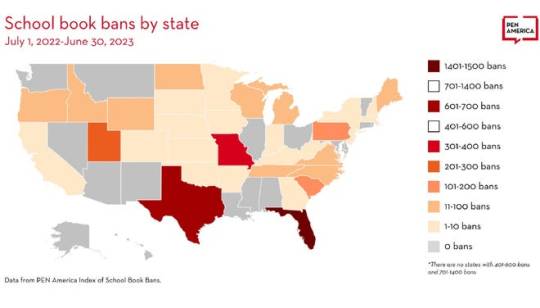
A year ago...
School districts across Florida have purged titles from their library shelves since DeSantis signed the Curriculum Transparency Act last year. It came as COVID-19 controversies brought more attention to what was happening in schools, especially from conservative activists and groups like Moms for Liberty.
As local chapters spring up across the state and nation, Moms for Liberty has become one of the leading voices trying to remove “inappropriate” books from schools.
DeSantis touted the law as a way to increase parental involvement in education and prevent "indoctrination." It requires districts to catalog every book they offer and put a formal review process in place for complaints
Then came House Bill 1069, which took effect July 1, further creating wildly-varyinginterpretations on what books should be removed from schools — and putting in question even more books. The law requires school districts to remove within five days any book challenged for including pornography or sexual conduct until the complaint is resolved.
Also coming into play over the last two years are state laws prohibiting instruction on sexual orientation or gender identity in school. School districts have removed books citing that law, though Florida Attorney General Ashley Moody recently said it doesn't apply to books.
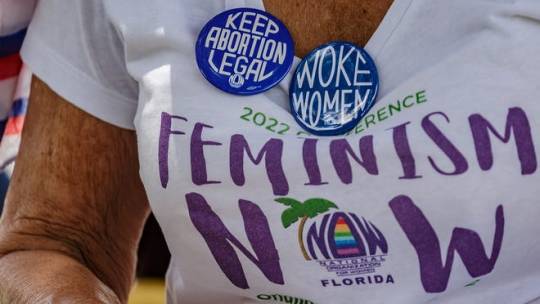
A look at the books
The Florida Department of Education recently released a list that school districts removed 386 book removals from 1,218 total objections last year.
But those are just titles that school boards decided to remove after receiving objections. PEN America's report goes beyond that and says state school districts banned 1,406. That's up from 566 last year.
The group's definition of a school book ban: "Any action taken against a book based on its content and as a result of parent or community challenges, administrative decisions, or in response to direct or threatened action by lawmakers or other governmental officials, that leads to a previously accessible book being either completely removed from availability to students, or where access to a book is restricted or diminished."
The list included books that were removed following official objections as well as unofficial ones, such as from concerned emails. The biggest portion of listed banned books are ones school districts removed pending a review of its content.
More than three quarters of books banned across the nation were books meant for younger audiences, like young adult, middle grade and picture books.
Nearly half of banned books included instances of violence or physical abuse, according to the report. Books with topics on student health and wellbeing made up 42%, and a third depicted sexual experiences.
Books with characters of color and themes or race and racism made up 30%. So did titles with LGTBQ characters or themes.
"Hyperbolic and misleading rhetoric about 'porn in schools,' 'sexually explicit,' 'harmful,' and 'age inappropriate' materials led to the removal of thousands of books covering a range of topics and themes for young audiences," reads the report. "Overwhelmingly, book bans target books on race or racism or featuring characters of color, as well as books with LGBTQ+ characters."
Federal lawmakers bicker on book bans:U.S. Senate hearing takes on book bans; Democrats highlight DeSantis' Florida policies
How one group goes after school books:Rockin' and rollin' with book challenges: Internal emails show Moms for Liberty plans
Context on the culture wars
What books should be on school shelves has been not only a question but a pivotal battle in Florida — and national — culture wars.
It’s far from resolved. The two sides can't even agree on the term "book ban."
This was highlighted during a United States Senate Judiciary Committee hearing from earlier this month.
“To put it bluntly, books aren’t being banned,” said Max Eden, one of the Republicans' witnesses and a research fellow for the American Enterprise Institute.
Eden, who has done research disputing book ban claims, pointed to how removed books could still be purchased on Amazon. He said that most of the books claimed to be banned by national book access advocates are still in school libraries.
But, for books that are removed, he said communities have to draw a line somewhere. He went on to read an explicit passage from “All Boys Aren’t Blue,” a memoir and manifesto by George M. Johnson, who reflects on growing up Black and queer. It’s listed as one of the nation’s most banned books by PEN America.

DeSantis has taken a similar tack in responding to the controversy.
He’s maintained that the idea of book bans across Florida, which have made many headlines, is a "hoax." Conversely, though, he’s bashed books that have been recently restricted in public schools as pornographic, violent or otherwise inappropriate.
“Exposing the ‘book ban’ hoax is important because it reveals that some are attempting to use our schools for indoctrination,” DeSantis said in a statement. “In Florida, pornographic and inappropriate materials that have been snuck into our classrooms and libraries to sexualize our students violate our state education standards."
#Florida is the nation's book banning leader#according to national free speech group#florida#education#Black History#Black Florida History#Black Books Matter#book banning#florida is the book banning haven of white supremacy#desantistan#white hate
108 notes
·
View notes
Video
youtube
Gov. Ron DeSantis, R-Fla., is facing criticism over Florida's overhaul to Florida’s African American history standards, and DeSantis now seems to be distancing himself from those standards, some of which instruct middle schoolers to be instructed that slavery taught beneficial skills
#florida#desantis#black history#Black Education#Black History Matters#Ron DeSantis is dumb#gop#Demolishing Black HIstory#Black Florida Educational Standards#Black Florida History
2 notes
·
View notes
Text
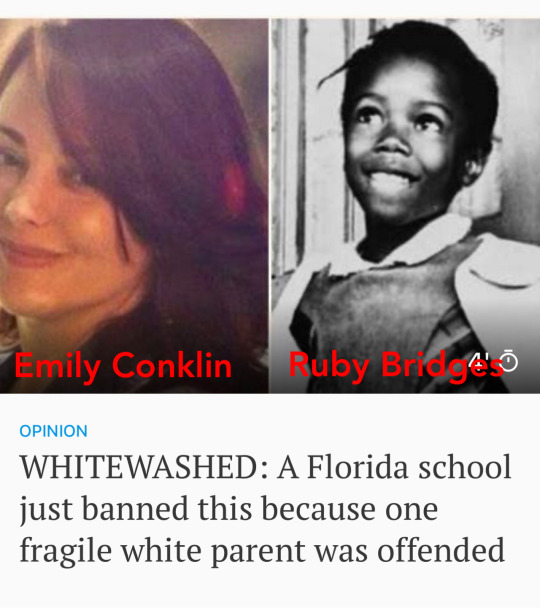
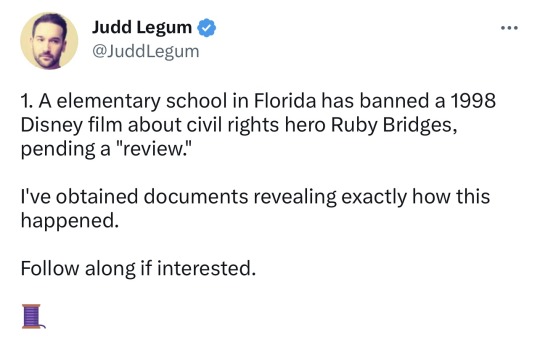
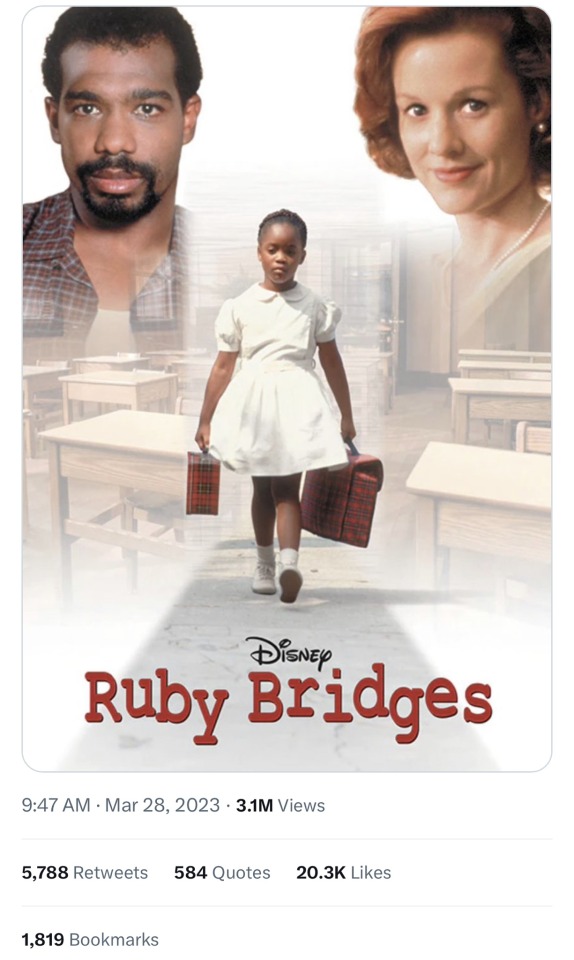
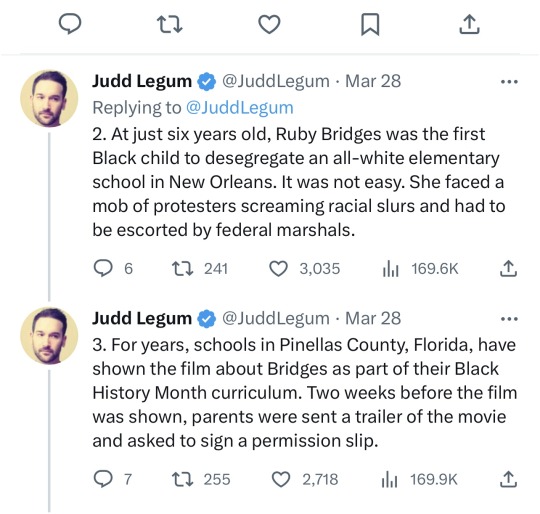
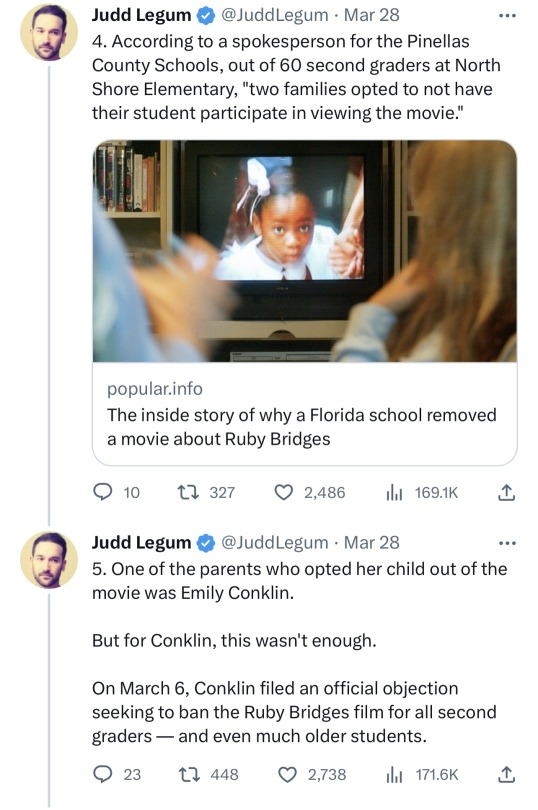
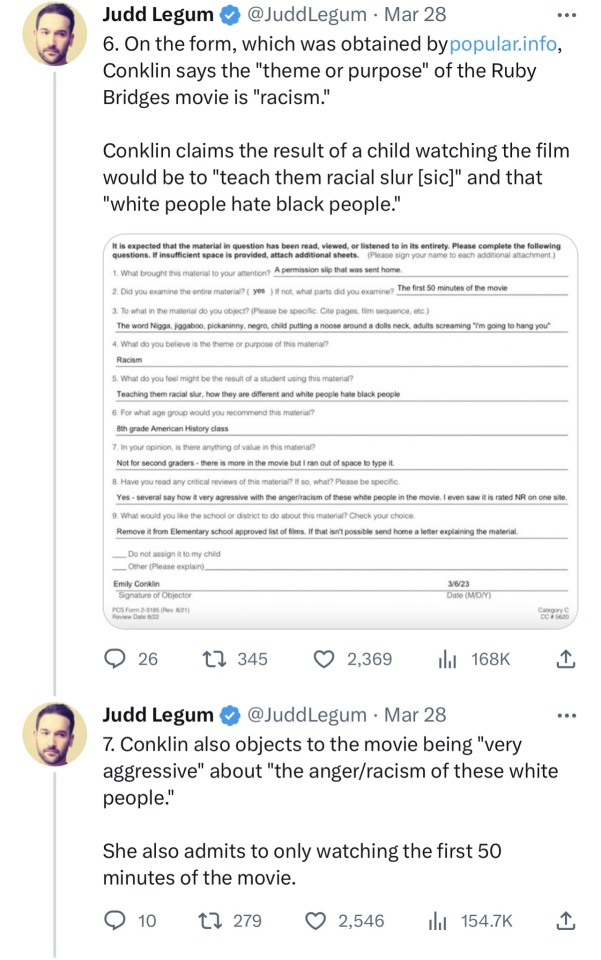
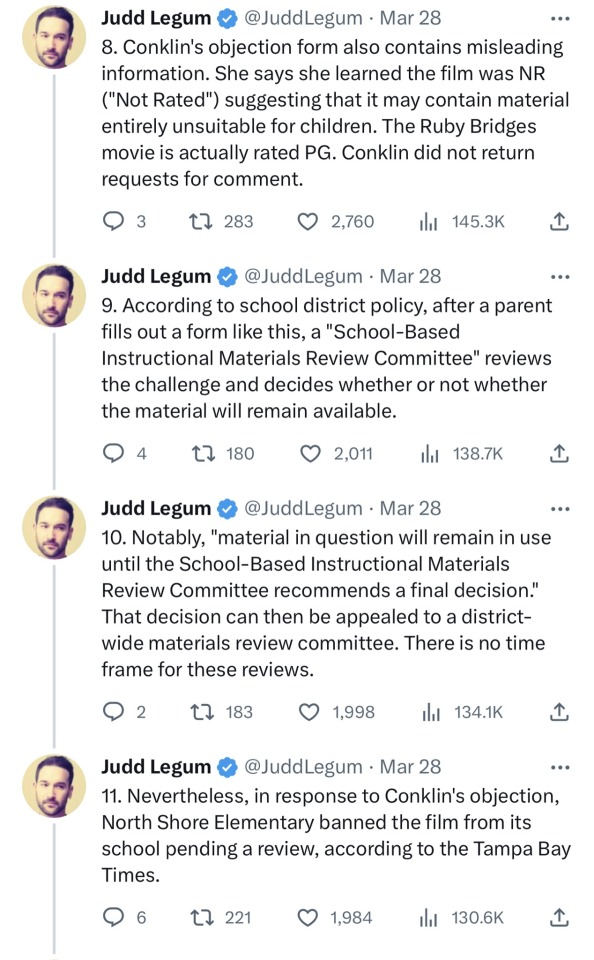
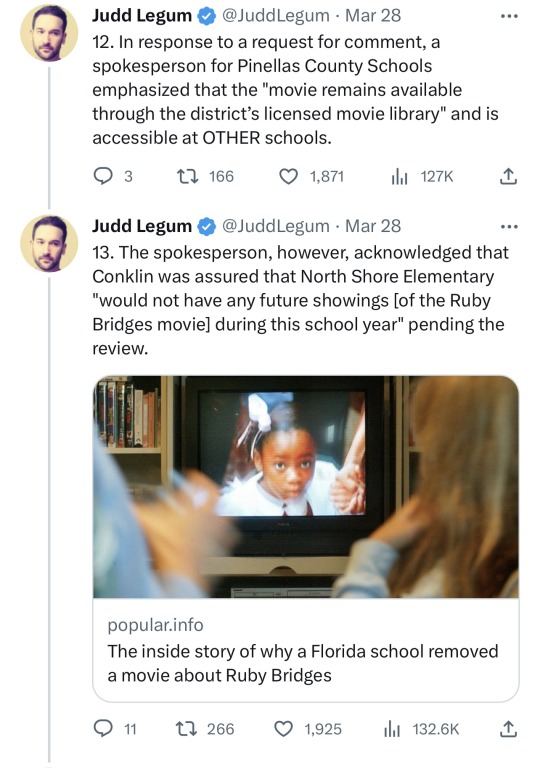
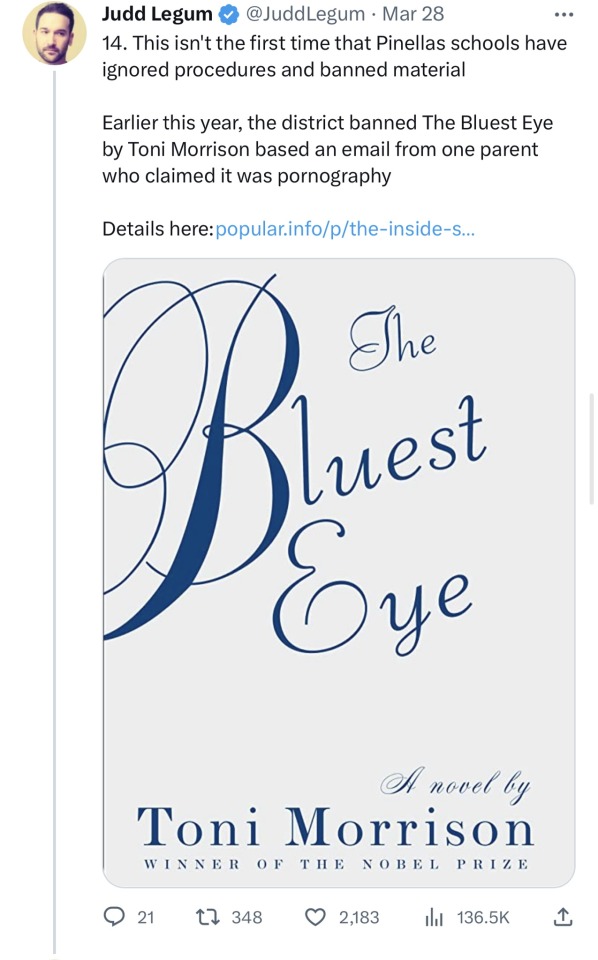

This is recent history. Ruby Bridges is 68yrs old and she is still alive.
Emily Conklin is thee definition of a racist Karen, and she is trying to whitewash the history white children learn by erasing a rated PG Disney movie that has already been shown for years in Pinellas County schools, usually as a part of Black History Month.
Two immediate thoughts that come to mind are:
“The people who threw rocks at Ruby Bridges for trying to go to school in 1960 now are upset their grandchildren might learn about them throwing rocks at Ruby Bridges for trying to go to school.”
and
“IF BLACK CHILDREN ARE OLD ENOUGH TO EXPERIENCE RACISM, WHITE CHILDREN ARE OLD ENOUGH TO LEARN ABOUT IT”
Look, Ruby Bridges was six years old when racist white parents (men and women) threw rocks and hissy fits because she was trying to get an education. A full year younger than most of the white children who are now being “protected” from learning the truth about what their grandparents did.
I guess these delicate snowflakes are so triggered by the racism of their elders that they need to get the Republican governor to whitewash away the truth.
I’m almost 40yrs old and I used to wonder how it was that in college, white kids my age genuinely believed that Martin Luther King, Jr. died of old age. But somehow, every single Black person my age knew the truth. How does that happen?? This is how it happens. This is a prime example of precisely how that happened and still happens—because to “protect” them from the truth, white kids weren’t taught that he was assassinated. It’s literally no different than raising generations of white kids to believe that 2+2=5. There’s going to be serious problems when they hit the real world. But what can I say? Conservatives like ‘em dumb and ignorant.
Anyway, this is how you get generations of fully grown white adults who truly honestly believe foolishness like “racism is over,” or “Martin Luther King basically ended racism,” or, “we don’t need affirmative action because there is no more racism; if anything it’s white people who are more discriminated against now.” (The majority of white people polled said the same thing in the 1960s too, btw).
Keeping as many white people as possible ignorant of the truth does not happen by accident. It’s very intentional. And that’s not to say that ALL white people are ignorant of the truth. Some of them, like Emily Conklin, know the truth, but just do not care.
And make no mistake: The same white people who want to keep their white children “pure” and “innocent” have ZERO problems criminalizing and sending young Black children directly to jail for even the slightest misbehavior in a classroom.
Evil, racist cowards (redundant, I know).
#politics#emily conklin#republicans#ruby bridges#whitewashing history#erasure#north shore elementary school#black history#crt#critical race theory#book banning#florida#floriduh#ron desantis
2K notes
·
View notes
Text
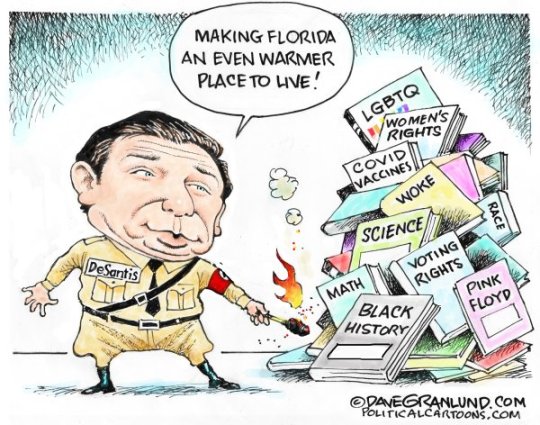
#ron desantis#lbgqt#sports#florida#black lives matter#blm#woc#poc#feminism#black history#gop#republicans
1K notes
·
View notes
Text

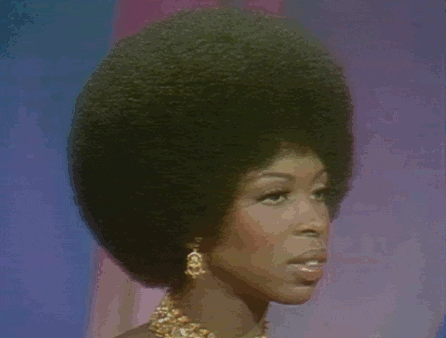
#happy bhm#black history month#“i just find it hard to believe that.....”#Ikr? I do too.#shit was wild#that's why they don't teach it in Florida anymore#because the truth is fucked up#lmfao
56 notes
·
View notes
Text
Worried by Florida’s history standards? Check out its new dictionary!
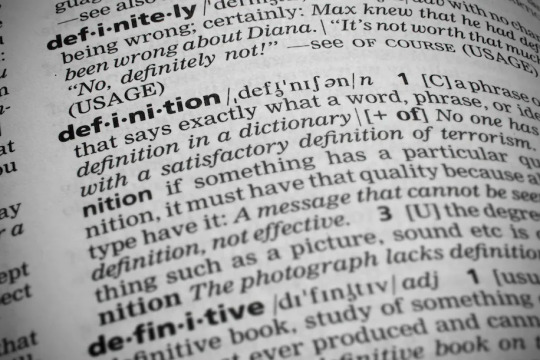
As always, Alexandra Petri is spot on in satirizing the right-wing censorship and educational nonsense happening in Florida. This is a gift 🎁 link, so you can read the entire column, even if you don't subscribe to The Washington Post.
Below are some excerpts 😂:
Well, it’s a week with a Thursday in it, and Florida is, once again, revising its educational standards in alarming ways. Not content with removing books from shelves, or demanding that the College Board water down its AP African American studies curriculum, the state’s newest history standards include lessons suggesting that enslaved people “developed skills” for “personal benefit.” This trend appears likely to continue. What follows is a preview of the latest edition of the dictionary to be approved in Florida.
Aah: (exclamation) Normal thing to say when you enter the water at the beach, which is over 100 degrees.
Abolitionists: (noun) Some people in the 19th century who were inexplicably upset about a wonderful free surprise job training program. Today they want to end prisons for equally unclear reasons.
Abortion: (noun) Something that male state legislators (the foremost experts on this subject) believe no one ever wants under any circumstances, probably; decision that people beg the state to make for them and about which doctors beg for as little involvement as possible.
American history: (noun) A branch of learning that concerns a ceaseless parade of triumphs and contains nothing to feel bad about.
Barbie: (noun) Feminist demon enemy of the state.
Biden, Joe: (figure) Illegitimate president.
Black history: (entry not found)
Blacksmith: (noun) A great job and one that enslaved people might have had. Example sentence from Florida Gov. Ron DeSantis (R): “They’re probably going to show that some of the folks that eventually parlayed, you know, being a blacksmith into doing things later in life.”
Book ban: (noun) Effective way of making sure people never have certain sorts of ideas.
Censorship: (noun) When other people get mad about something you’ve said. Not to be confused with when you remove books from libraries or the state tells colleges what can and can’t be said in classrooms (both fine).
Child: (noun) Useful laborer with tiny hands; alternatively, someone whose reading cannot be censored enough.
[...]
[See more select "definitions" below the cut]
Classified: (adjective) The government’s way of saying a paper is especially interesting and you ought to have it in your house.
Climate change: (noun) Conspiracy by scientists to change all the thermometers, fill the air with smoke and then blame us.
[...]
Constitution: (noun) A document that can be interpreted only by Trump-appointed and/or Federalist Society judges. If the Constitution appears to prohibit something that you want to do, take the judge on a boat and try again.
[...]
DeSantis, Ron: (figure) Governor who represents the ideal human being. Pronunciation varies.
Disney: (noun) A corporation, but not the good kind.
[...]
Election: (noun) Binding if Republicans win; otherwise, needs help from election officials who will figure out where the fraud was that prevented the election from reflecting the will of the people (that Republicans win).
[...]
Emancipation Proclamation: (noun) Classic example of government overreach.
Firearm: (noun) Wonderful, beautiful object that every person ought to have six of, except Hunter Biden.
[...]
FOX: News.
Free speech: (noun) When you shut up and I talk.
Gun violence: (noun) Simple, unalterable fact of life, like death but unlike taxes.
[...]
Jan. 6: (noun) A day when some beautiful, beloved people took a nice, uneventful tour of the U.S. Capitol.
King Jr., Martin Luther: (figure) A man who, as far as we can discern, uttered only one famous quotation ever and it was about how actually anytime you tried to suggest that people were being treated differently based on skin color you were the real racist. Sample sentence: “Dr. King would be enraged at the existence of Black History Month.”
Liberty: (noun) My freedom to choose what you can read (see Moms for Liberty).
Moms for Liberty: (noun) Censors, but the good kind.
[...]
Pregnant (adjective): The state of being a vessel containing a Future Citizen; do not say “pregnant person”; no one who is a real person can get pregnant.
Queer: (entry not found)
Refugee: (noun) Someone who should have stayed put and waited for help to come.
Slavery: (noun) We didn’t invent it, or it wasn’t that bad, or it was a free job training program.
Supreme Court: (noun) Wonderful group of mostly men without whom no journey by private plane or yacht is complete.
Trans: (entry not found)
United States: (noun) Perfect place, no notes.
[emphasis added to defined words]
#florida#ron desantis#black history#educational standards#alexandra petri#satire#the washington post#gift link
150 notes
·
View notes
Text
In case you missed it: Florida is requiring schools to teach slavery taught "skills that personally benefit Black people".
This video shows just how ridiculous that notion is.
Original link: https://www.tiktok.com/t/ZT8LPm9Tx/
108 notes
·
View notes
Text
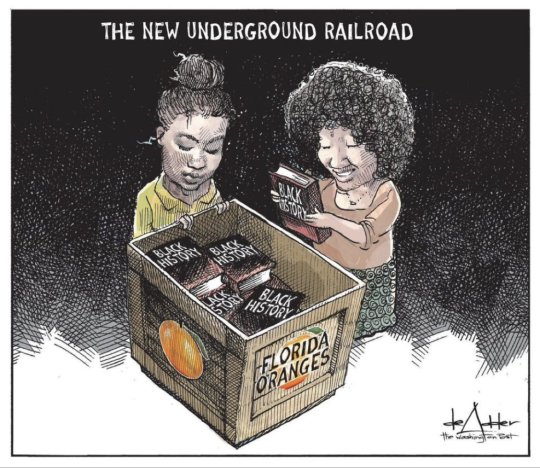
#BlackHistoryMonth ✊🏿✊🏽✊🏿#Black history#us history#black history month#civil rights#civil rights movement#black history 365#black history continued 2021#black history matters#black lives matter#black history 2022#Black history month#black lives fucking matter#black lives movement#ron deathsantis#gov. ron desantis#ron desatanist#ron desanctimonious#ron desantis#florida governor ron desantis
368 notes
·
View notes
Text
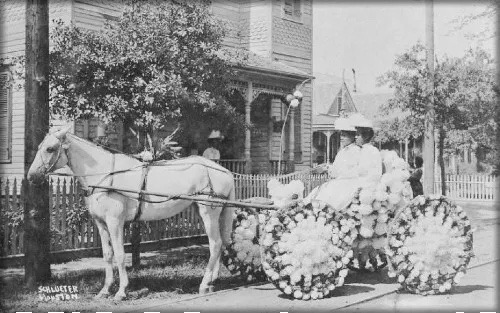
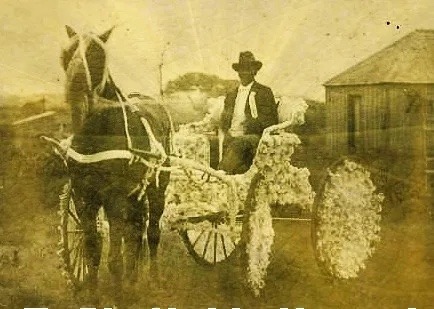
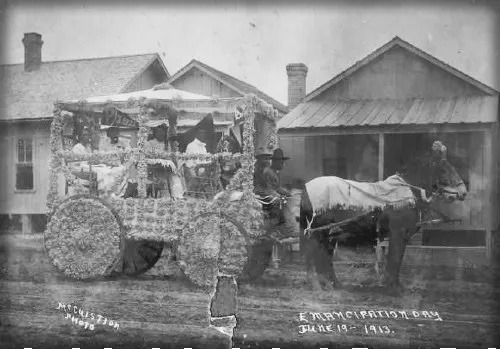
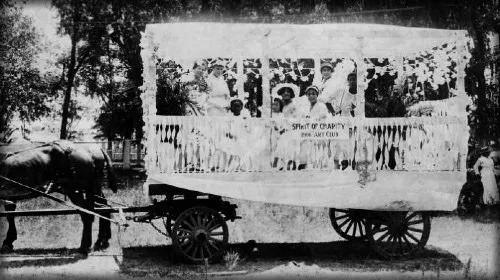

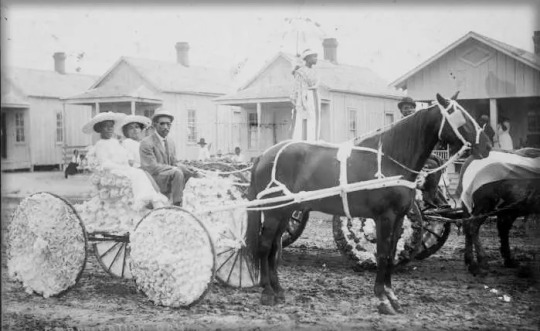
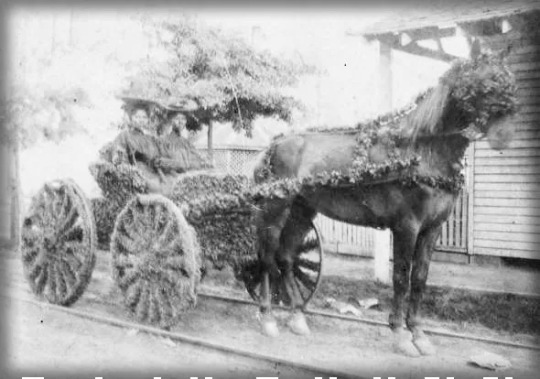
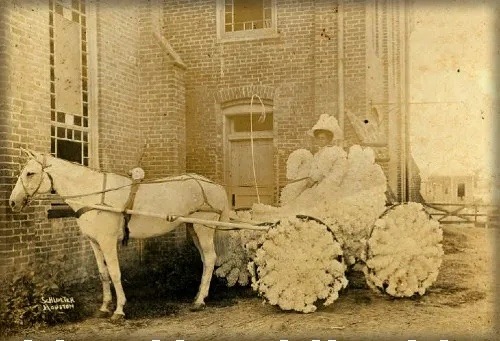
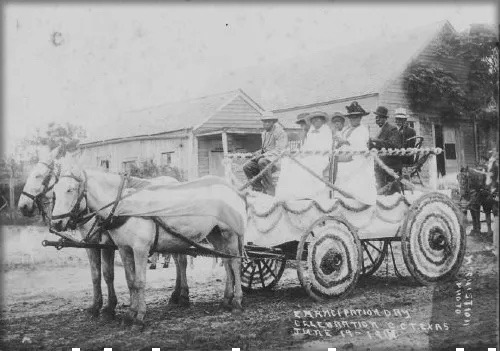
Carriages decorated in flowers celebrating “Juneteenth” (June 19, 1913)
Since 1865, June 19th has been the annual Day of Jubilee marking the end of slavery in America. While the official date was marked with the enactment of the Emancipation Proclamation on January 1, 1863, the news was not heard in Texas until June 19, 1865. Celebrations broke out spontaneously and the day became a yearly event.
#I live in Florida and went to a Black History meeting and learned about this and wanted to share#i never knew this#and thought it was beautiful…#juneteenth#june 19th#slavery#america#us history#american history#florals#educational#black history#sepia#black and white#photography#fuck texas#fuck white supremacy#day of jubilee#emancipation proclamation#1900s#early 1900s#photographs#vintage photos
20 notes
·
View notes
Text

#Florida#ron desantis#racism#literally disgusting#my friend thinks they’ll probably use misconstrued Frederick Douglas quotes#“Oh but he learned to read while being a slave so”#Destiel#Destiel meme#Whitewashing#black history
64 notes
·
View notes
Text

https://www.miamiherald.com/news/local/education/article278582149.html
Tallahassee
When Florida rejected a new Advanced Placement course on African American Studies, state officials said they objected to the study of several concepts — like reparations, the Black Lives Matter movement and “queer theory.”
But the state did not say that in many instances, its reviewers also made objections in the state’s attempt to sanitize aspects of slavery and the plight of African Americans throughout history, according to a Miami Herald/Tampa Bay Times review of internal state comments.
For example, a lesson in the Advanced Placement course focused on how Europeans benefited from trading enslaved people and the materials enslaved laborers produced. The state objected to the content, saying the instructional approach “may lead to a viewpoint of an ‘oppressor vs. oppressed’ based solely on race or ethnicity.”
In another lesson about the beginnings of slavery, the course delved into how tens of thousands of enslaved Africans had been “removed from the continent to work on Portuguese-colonized Atlantic islands and in Europe” and how those “plantations became a model for slave-based economy in the Americans.”
READ MORE: DeSantis says AP African-American studies class was ‘pushing an agenda’
In response, the state raised concerns that the unit “may not address the internal slave trade/system within Africa” and that it “may only present one side of this issue and may not offer any opposing viewpoints or other perspectives on the subject.”
“There is no other perspective on slavery other than it was brutal,” said Mary Pattillo, a sociology professor and the department chair of Black Studies at Northwestern University. Pattillo is one of several scholars the Herald/Times interviewed during its review of the state’s comments about the AP African American Studies curriculum.
“It was exploitative, it dehumanized Black people, it expropriated their labor and wealth for generations to come. There is no other side to that in African American studies. If there’s another side, it may be in some other field. I don’t know what field that is because I would argue there is no other side to that in higher education,” Pattillo said.
Alexander Weheliye, African American studies professor at Brown University, said the evaluators’ comments on the units about slavery were a “complete distortion” and “whitewashing” of what happened historically.
“It’s really trying to go back to an earlier historical moment, where slavery was mainly depicted by white historians through a white perspective. So to say that the enslaved and the sister African nations and kingdoms and white colonizers and enslavers were the same really misrecognizes the fundamentals of the situation,” Weheliye said.
DeSantis’ efforts to transform education in Florida
The commentary is also an example of how Gov. Ron DeSantis has transformed the state’s education system in his quest to end what he calls “wokeism” and “liberal indoctrination” in schools — a fight that began in the aftermath of the pandemic and the Black Lives Matter movement that followed the high-profile murder of George Floyd at the hands of police in Minnesota.
“It’s not really about the course right? It’s kind of about putting down Black struggles for equality and freedom that have been going on for centuries at this point in time and making them into something that they are not through this kind of distorted rightist lens,” Weheliye said.
When asked about the findings of the previously unreported internal reviews, the Florida Department of Education said the course was rejected after state officials “found that several parts of the course were unsuitable for Florida students.”
Cailey Myers, a spokesperson for the agency, cited the work of many Black writers and scholars associated with the academic concepts of critical race theory, queerness and intersectionality — a term that she said “ranks people based on their race, wealth, gender and sexual orientation.” The term, however, refers to the way different social categorizations can interact with discrimination.
Brandi Waters, the executive director of the AP African American Studies course, said it is hard to understand the Florida Department of Education’s critiques on the content because state officials have not directly shared their internal reviews with the College Board. The state and the College Board, however, were in communication about the course for several months before it was rejected.
Waters maintains the coursework submitted to the state was the most holistic introduction to African American Studies.
A deeper look at Florida’s objections
The course materials provided by the College Board were reviewed by Florida Department of Education’s Bureau of Standards and Instructional Support and the decision to reject the course was made by “FDOE senior leadership,” records show.
John Duebel, the director of the state agency’s social studies department, and Kevin Hoeft, a former state agency official who now works at the New College of Florida in Sarasota, were identified as the two evaluators in the review. Hoeft is listed as an “expert consultant” to the Civics Alliance, a national conservative group that aims to focus social studies instruction in the Western canon and eliminate “woke” standards. His wife is a member of the conservative group Moms for Liberty.
Duebel declined to comment on the story and referred questions to the Department of Education, which did not respond. Hoeft did not respond to a request seeking comment. While the documents say that Duebel and Hoeft led the state reviews, much of the comments included in the state review are not attributed, making it hard to tell who said what.
The documents reviewed were provided to the Herald/Times by American Oversight, a left-leaning research organization that sued the state Department of Education for the records.
“We sued the Florida Department of Education to shed light on the DeSantis administration’s efforts to whitewash American history and turn classrooms into political battlegrounds,” American Oversight Deputy Executive Director Chioma Chukwu said in a statement. “The records obtained by American Oversight from Florida’s internal review of the AP African American Studies course expose the dangers of Gov. DeSantis’ sweeping changes to public education in Florida, including preventing students from learning history free from partisan spin.”
READ MORE: How a small, conservative Michigan college is helping DeSantis reshape education in Florida
The documents offer more detail into the state’s reasoning for rejecting the pilot course from being offered to high school students in Florida — and how topics related to racism, identity and gender were continually flagged out of concern that lessons were biased, misleading or “inappropriate” for students.
And, in cases where state officials did not find a violation of a state law or rule, concerns were often raised about how educators would teach the content, underscoring the growing distrust between state officials and educators as disputes over social issues engulf local school politics.
For example, the state worried educators teaching about how the 1960s Black is Beautiful movement helped lay a foundation for multicultural and ethnic studies movements, could “possibly teach that rejecting cultural assimilation, and promoting multiculturalism and ethnic studies are current worthy objectives for African Americans today.”
“This type of instruction tends to divide Americans rather than unify Americans around the universal principles in the Declaration of Independence,”the state officials wrote about a lesson in the course.
Records also show how some of the comments made by the state evaluators contained contradictions, such as advocating for primary sources and then later writing that certain primary sources contained “factual misrepresentations.” Many comments from the state pushed for the material to include perspectives from “the other side” but failed to elaborate whose perspective they wanted to be added.
Slavery
One of the lessons in the course, for example, set out to teach students how slavery set back Black people’s ability to build wealth.
“Enslaved African Americans had no wages to pass down to descendants, no legal right to accumulate property, and individual exceptions depended on their enslavers’ whims,” the College Board’s lesson plan said.
When reviewing the content, however, state reviewers said the lesson plan might violate state laws and rules because it “supposes that no slaves or their descendants accumulated any wealth.”
“This is not true and may be promoting the critical race theory idea of reparations,” state officials wrote in documents reviewed by the Herald/Times. “This topic presents one side of this issue and does not offer any opposing viewpoints or other perspectives on the subject.”
While there were scattered instances where enslaved people were given the chance to earn money to pay for their freedom, the wealth they accumulated still did not belong to them, said Paul Finkelman, the editor-in-chief of Oxford University Press’ “Encyclopedia of African American History 1619-1895.”
“Under the law of every slave state, including Florida, no slave could own anything. That is, slaves did not own the clothes on their back. They did not own the shoes on their feet,” said Finkelman. “So for the Florida Education Department to question whether slaves accumulated property is to not understand that slaves owned no property. In fact, they were property belonging to slave owners.”
Even in cases where slaves were allowed to make money, Finkelman argued, it would be a stretch to say they were able to accumulate wealth.
Black middle class
Evaluators also objected to a lesson plan that taught how Black Americans, even after slavery, continue to experience wealth disparities due to ongoing discrimination.
The coursework included the following statement: “Despite the growth of the Black middle class, substantial disparities in wealth along racial lines remain. Discrimination and racial disparities in housing and employment stemming from the early 20th century limited Black communities accumulation of generational wealth in the second half of the 20th century.”
State reviewers, however, said the unit could potentially violate state rules because it failed to offer other reasons outside of systemic racism and discrimination for the wealth disparity between Black Americans and other racial groups.
“The only required resource in this topic cites ‘systemic racism,’ ‘discrimination,’ ‘systemic barriers,’ ‘structural barriers,’ and ‘structural racism’ as a primary or significant causative factor explaining this disparity of wealth,” wrote one evaluator. “This topic appears to be one-sided as non-critical perspectives or competing opinions are cited to explain this wealth disparity.”
Pattillo said that while many of the comments made by the state in the review claimed that they wanted to see more balance of perspectives in the course materials, she felt state officials largely tried to minimize the topics of discrimination.
Abolitionist Movement
When it came to teaching students about the movement to end slavery, the College Board highlighted some of the prominent activists who led that abolitionist movement and the ways the government tried to stop those who resisted slavery.
“Due to the high number of African Americans who fled enslavement, Congress enacted the Fugitive Slave Acts of 1793 and 1850, authorizing local governments to legally kidnap and return escaped refugees to their enslavers,” the lesson plan stated.
Primary sources were scrutinized
When the College Board addressed the resistance to slavery, it wanted to teach students how to “describe the features of 19th-century radical resistance strategies promoted by Black activists to demand change.” In that unit, the state objected to two primary sources: “The Appeal” by David Walker and “An Address to the Slaves of the United States” by Henry Highland Garnet.
State reviewers said that “The Appeal” included “content prohibited under Florida law,” but does not offer more details; and that “An Address to the Slaves of the United States” contains “factual mis-representations” and potential violations of state rules.
“They complain that this primary source is not historically accurate. Well, of course it’s not historically accurate because it’s a political speech. It is not a piece of history, but it’s a perfectly historically accurate primary source to understand the anger of a Black abolitionist,” Finkelman said.
However, earlier in the review, the evaluators applauded the College Board for stating that “anchoring the AP course in primary sources fosters an evidence-based learning environment” and that the course will be focused on the works and documents of African American studies rather than “extraneous political opinions or perspectives.”
“This is exactly how all courses are to be taught in the state of Florida and we commend [the] College Board on this position,” wrote the state reviewer .
Scholars’ political leanings questioned
In one review, one of the state evaluators questioned the balance of the content because of the individuals the College Board picked to develop the coursework.
But one of the evaluators had a gripe: they claimed that there were no conservative Black scholars. This was a concern because, as the state evaluator put it, there may not be an “adequate level of intellectual balance.”
“Conservative and traditional liberal members may need to be added to the committees to bring balance and ensure compliance with Florida statutes, rules, and policies,” the state evaluator wrote.
Waters said the College Board is focused on having scholars on their committees who are the leaders in the field of African American studies and that their political background isn’t something they take into consideration.
“In terms of the scholars, we never really asked them ‘what is your political background?’,” Waters said. “I don’t assume that is a characteristic that remains static in a person’s life over time.”
“What we do is look for scholars who represent the expertise needed for the course. So who is leading the field in how we understand the origins of the African diaspora? Who is leading the field in cutting edge research on unearthing new perspectives of the civil rights movement? We look for their expertise and also the different backgrounds that they represent,” she added.
How did we get to this point?
While Florida law requires the study of African American history, the state reviews of the AP course show how the DeSantis administration and Republican policymakers are implementing changes to how schools can teach about race, slavery and other aspects of Black history.
In 2021, Florida barred lessons that deal with critical race theory, a 1980s legal concept that holds that racial disparities are systemic in the United States and not just a collection of individual prejudices. Critical race theory was not being taught in Florida schools. The state also barred lessons about “The 1619 Project,” a New York Times project that reexamines U.S. history by placing the consequences of slavery and contributions of Black Americans at the center.
A year later, the Republican-led Legislature approved a new law, known as the “Stop W.O.K.E. Act,” which prohibited instruction that could prompt students to feel discomfort about a historical event because of their race, ethnicity, sex or national origin.
To DeSantis, the restrictions are a necessary effort to protect students from what he sees as a cultural threat that, as he puts it, teaches “kids to hate this country.” But the policies have been widely criticized by Democrats, educators, historians and even a few Republican lawmakers who see the laws as an attempt to distort historic events.
State officials’ interpretation of these policies collided with many of the learning objectives outlined in the A.P. courses. This collision, some scholars say, is emblematic of the chilling effect the state’s vague laws can foster in academia.
“I think this is the point that many people have been saying,” Pattillo said. “That the misguided blanket use of this term critical race theory, and in the absence of some definition of what that means or what they think it means, makes any teaching of racism questionable per that vagueness...”
Based on the state reviews the Herald/Times provided to him, Finkelman said it appeared the state was “hunting for bias.”
“And if you hunt long enough, you can find bias anywhere,” Finkelman said, noting that “anyone can find faults, and even small mistakes with any scholarly enterprise.”
To do the job right, Finkelman said, the state should ensure the course is reviewed by historians, with expertise in the specific subject area — not political scientists or state bureaucrats. He questioned whether the state prioritized reviewers’ credentials after seeing the state’s comments on the topics of slavery, or subjects that took into account the issue of racism and identity.
Based on Finkelman’s review of the content, he said, the state reviewers were more interested in correcting content based on their reading of the material over “scholarly accuracy.”
Read more: Only 3 reviewers said Florida math textbooks violated CRT rules. Yet state rejected dozens
Since Florida rejected the pilot course in January, students in other parts of the country have been taking part in the pilot program. Education officials in only one other state — Arkansas — are disputing whether to make the AP course eligible for credit. The Arkansas Department of Education — led by Florida’s former K-12 Chancellor Jacob Oliva — recently removed the class from its course code listing.
In November, the College Board plans to submit the final version of the course’s curriculum for approval. But with Florida’s laws still in place, the fate of the course remains in limbo — and the outcome could potentially make Florida students in public high schools less likely to have access to the course. If approved, parents and students can choose to enroll in the course.
College Board officials are aware of this possibility, but remain hopeful.
“We certainly hope that Florida students will have the opportunity to take this course,” said Holly Stepp, a spokesperson with the College Board.
Myers, the Florida Department of Education spokesperson, said the College Board is welcome to resubmit the course for review in November.
But, Myers said, “at this point, it is inappropriate to comment on what the future could hold – it is just speculation.”
This story was originally published August 29, 2023, 5:30 AM.
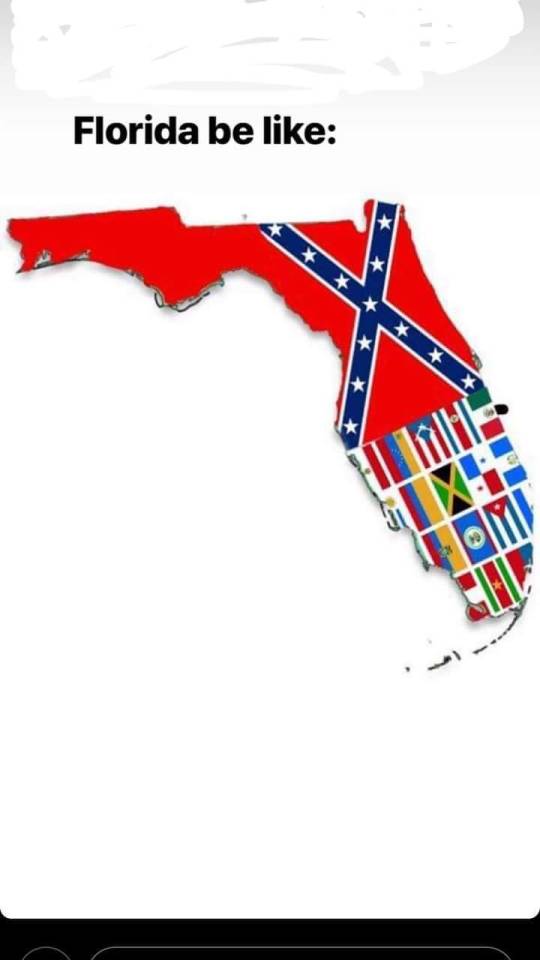
#florida#white washing history#Black Lives Matter#Black History Matters#ron desatan#white lies#florida department of education#florida students
114 notes
·
View notes
Text
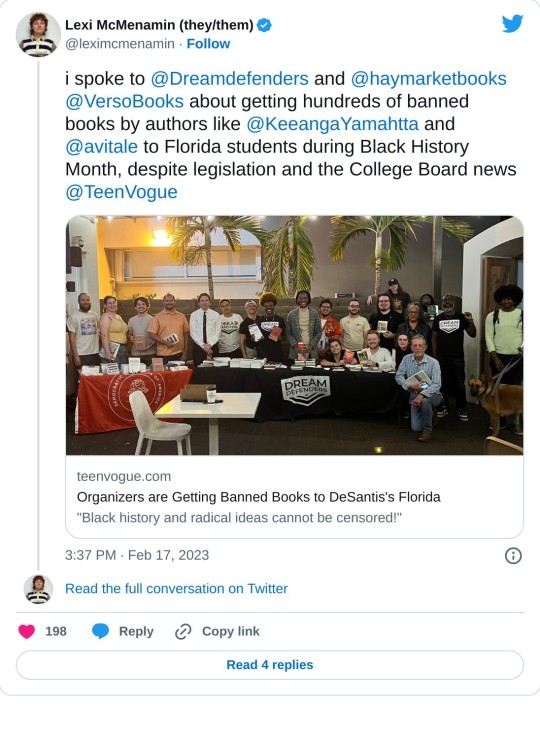
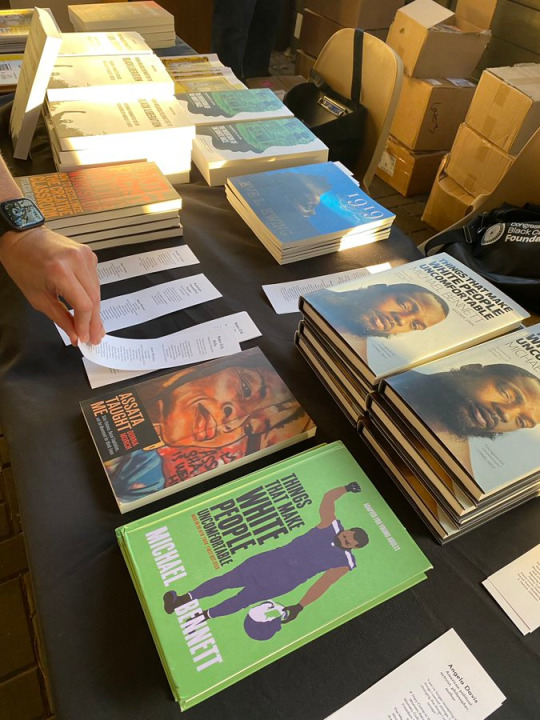
Organizers are Fighting Ron DeSantis's Educational Bans with Free Books
Education in the state of Florida is under siege. During the first Black History Month since the passage of governor Ron DeSantis’s “Stop W.O.K.E. Act,” Florida teachers papered over their bookshelves over unclear punishments for sharing materials with students regarding “race and diversity in schools and in the workplace, particularly anything that discusses privilege or oppression based on race.” In an interview with the New Yorker, the president of the Florida Education Association estimated that a third of the state’s counties were instructed to cover up their bookshelves until confirmation that the materials were allowed under Florida law.
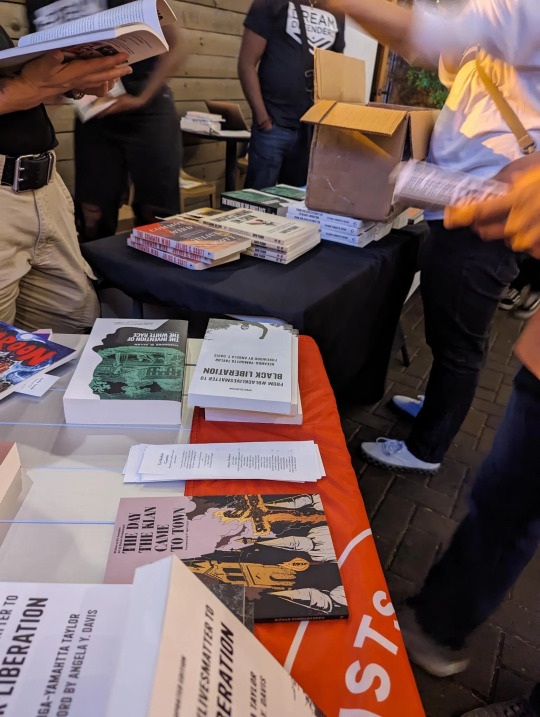
During the same period, DeSantis’s administration took credit for the College Board’s announcement that they would be updating their AP African American studies curriculum. Commentators noted that many of the changes made were subjects critically highlighted by the state’s Department of Education and education commissioner in the weeks before. The changes included the removal of “Black Lives Matter, slavery reparations, and queer theory as required topics, and it adds a section on Black conservatism,” per Amy Goodman of Democracy Now!.
While these headlines may be shocking, they come as no surprise to those on the ground in Florida. “It's in line with things that he's always had planned for Florida, and we've always known what his ideas were and what he planned to do to us. So it's shocking, but it's not surprising,” Alisha Cox, an organizer with the Florida-based Dream Defenders, told Teen Vogue. So Dream Defenders got to work, connecting with leftist publishers including Haymarket Books, Verso, and PM Press, to distribute books and literature to Florida students.
“I have 150 copies of From #BlackLivesMatter to Black Liberation in my house right now,” Cox told me, laughing, days out from the February 15th book distribution event cohosted by the group with the Broward County Democratic Socialists of America (DSA). The book, by academic Keeanga-Yamahtta Taylor, was recently left off the College Board reading list for the AP course. “And they’re sending more.” On the 15th, Dream Defenders and the DSA gave away the books donated by publishers for free.
As part of this effort, Haymarket Books made Taylor’s From #BlackLivesMatter and two other titles – Black Lives Matter at School: An Uprising for Educational Justice by Jesse Hagopian and Denisha Jones, and 1919 by Eve L. Ewing – free to all as ebooks. They also encouraged “young [people] looking for radical books to read and share, an educator looking to grow your library, or part of an organization that’s in the fight” to reach out via a form for free books. “We at Haymarket stand in solidarity with all those in Florida and across the country who are organizing to resist. We know that books can be dangerous to those in power, especially when they are in the hands of folks who are organizing to fight for liberation. That’s why we publish them. That’s why they’re trying to ban them,” the company said in a statement.
In a statement to Teen Vogue, Verso Books said, “We're proud to provide free copies of Racecraft by Barbara and Karen Fields, The End of Policing by Alex Vitale, The Common Wind by Julius Scott, How Europe Underdeveloped Africa by Walter Rodney, and The Invention of the White Race by Theodore Allen. Black history and radical ideas cannot be censored!" Vitale, who is participating in the effort, told Teen Vogue via email, “From Ron DeSantis to Ted Cruz, the politics of erasing America's long history of structural racism is part of a larger project of attacking movements for racial and economic justice to protect the entrenched interests of the 1 percent. Resisting that project through the free flow of ideas is essential and I'm thrilled to be included in any such endeavors.”
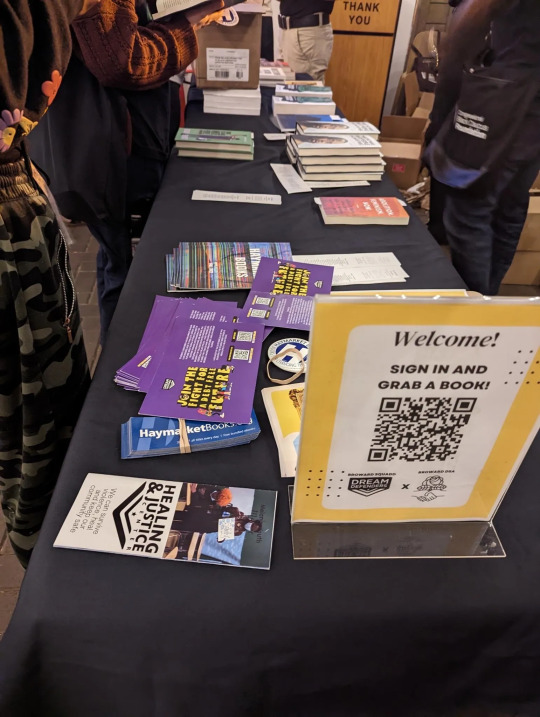
According to Haymarket’s Dana Blanchard, recipients of free books have shared they’re being used for “free community libraries with families in their neighborhood, teachers who are giving books to their students, youth-led organizations who are creating discussion groups on their campuses and more.” Blanchard said, “One social worker we sent a bundle of books to is working to create resource bags with free books and mental health resources to distribute at libraries and community service providers. It is really amazing to see the creative ways people are upending the system and using their networks to organize against censorship and we are happy to provide books to support their efforts.”
Conversely: “It's very disappointing to see the ways that this administration has chosen to come at education,” said Cox, “especially in a place like Florida, where we're such a melting pot. Florida has such a rich Black history that people don't know about, towns like Rosewood and Eatonville, that people know nothing about. And rather than centering these stories of the now-marginalized communities that have built this state, [DeSantis is] saying that they are not of educational value.”
When asked what kind of complaints students have raised with Dream Defenders over the school censorship, Cox said they’re mostly confused: “They have the internet. They have TikTok. Honestly, it just makes them want to look more into it themselves and maybe that's a good thing. But I haven't spoken to a single student that was happy or felt good about what was happening in their schools. They're reaching out to us and asking how we can help them organize against it.”
It’s all part of DeSantis’s likely 2024 presidential goals to show Florida, in his words, “serving strongly as freedom’s linchpin,” says Tampa Bay Times columnist Stephanie Hayes, free from books, small liberal arts colleges, diversity, equity, and inclusion programs, tenure for professors, privacy for menstruating high school athletes, indoctrination “unless it’s the right kind of indoctrination,” and the list goes on. And while DeSantis tells America he’s making Florida better, Cox said, “He's moving in a way that, from when we canvass, when we talk to people, does not align with the actual people of Florida and the actual communities in Florida.”
It’s hard to keep track of all the changes DeSantis is rolling out in educational institutions. He recently appointed anti-CRT campaigner Christopher Rufo to the board of trustees of the New College, after DeSantis’s fall 2022 push to appoint former senator Ben Sasse as president of the University of Florida.
Cox didn’t mince words when it came to her thoughts on DeSantis’s priorities. “When I look at the statistics in Florida, I just don't understand why these are the things that he's focused on. Seventy-three percent of African American children in Florida live at or below the poverty line. Sixty-six percent of Hispanic and Latino children live at or below the poverty line,” she continued. (These numbers are based on the ALICE – Asset Limited, Income Constrained, Employed – threshold, which is slightly higher than the federal poverty line.) “And you're taking away books? You're taking away courses at school? You're taking away their education? I don't understand.”
On Thursday, February 23, Dream Defenders have planned walkouts, demonstrations, and teach-ins across Florida.
#Organizers are Fighting Ron DeSantis's Educational Bans with Free Books#Black Authors#Black Books#florida#Black History Matters#Black Books Matter#florida educational apartheid#desantis hates Black People#Black Florida History
0 notes
Text




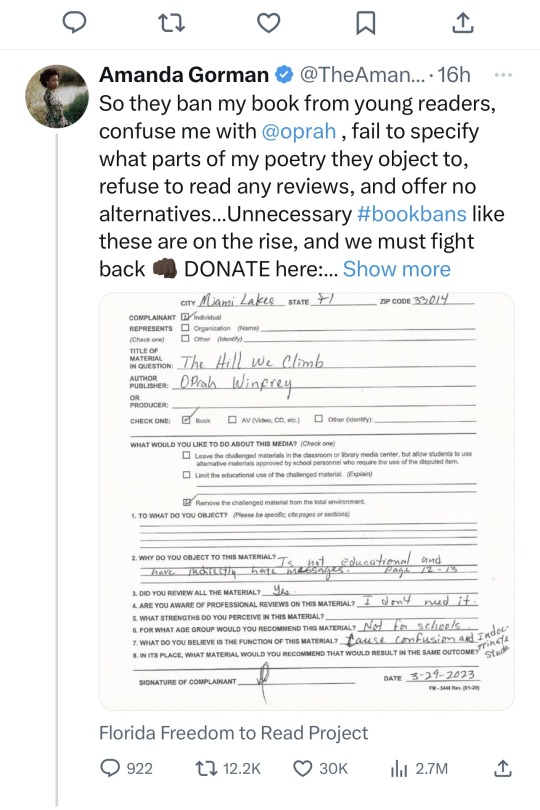

At this point, Florida Republicans and fragile white Republican voters are just flat out targeting any books written by Black authors who refuse to sing “Zip-a-Dee-Doo-Dah” and whitewash away the past.
This is racist erasure.
Here is the IG link to Amanda Gorman’s donations page.
#amanda gorman#the hill we climb#politics#florida#republicans#book bans#whitewashing history#black history#erasure#ron desantis#racism
222 notes
·
View notes
Text
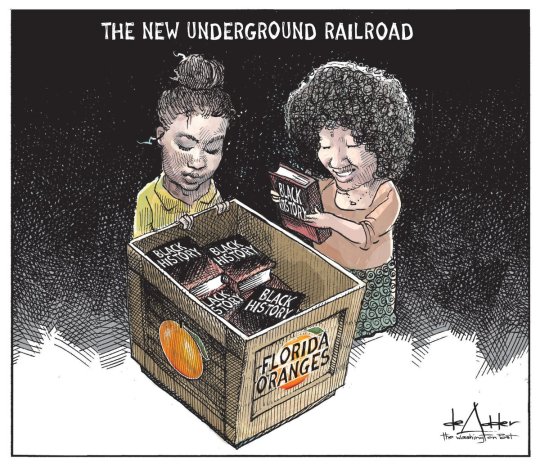
113 notes
·
View notes
Photo
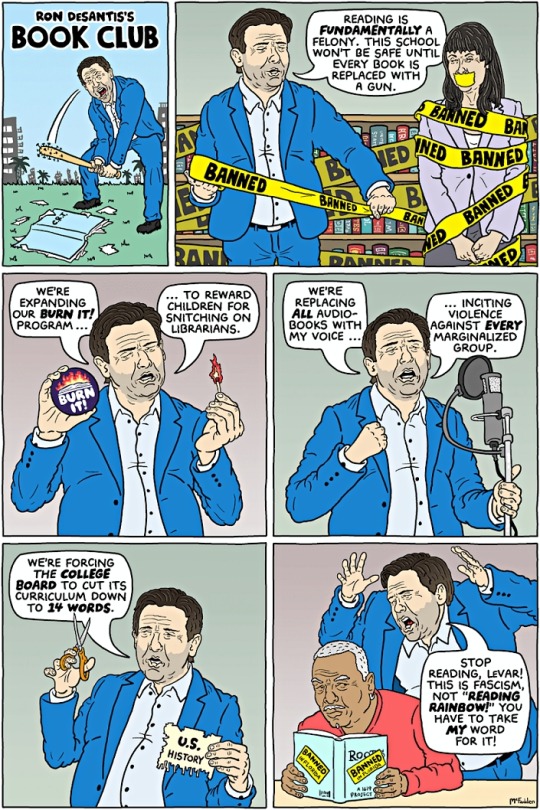
Ron DeSantis continues to observe Black History Month in his unique way.
Ron’s “book club” is actually a physical club.
Those scissors are symbolic of DeSantis wanting to cut Social Security.
Ron DeSantis once expressed support for privatizing Social Security and Medicare giving his rivals an opening
#ron desantis#black history month#florida#florida gop#censorship#book banning#reading#fascism#a.p. african american history#levar burton#social security#election 2024#brian mcfadden
147 notes
·
View notes